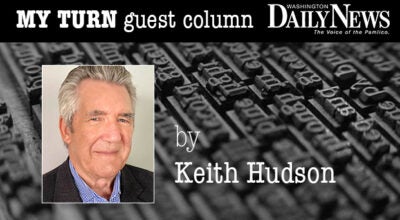From furniture to filtration, book highlights history of Flanders
Published 11:14 am Monday, February 12, 2018

- DREAM IT: George Cadwell Jr. was Flanders Filters vice president from 1949 until 1988. He and former Flanders’ President Tom Allan, son of founder Sam Allan, have written a memoir about the company’s origins, its move to Washington and its rise to filtration exceptionalism — with a few funny stories thrown in. (Vail Stewart Rumley/Daily News)
George Cadwell Jr. has been all over the world. He’s been in embassies and animal disease research labs, in nuclear facilities and the basement clean room of what was, in 1966, the largest “clean room” in the world at Texas Instruments in Dallas, Texas. In that particular incident, it was Cadwell and Tom Allan in that basement for six weeks, finding the fix for 1,000 filters.
They were Flanders Filters, at the time — Cadwell, an engineer and the company’s vice president; Allan, the son of Flanders Filters founder Sam Allan, a marketing executive turned filtration patent creator, who would later become the company’s president.
The two have many stories to tell about the early days of a company founded in a small Long Island town, and they tell them in the new book, “American Dream — From Coasters to Containment: A Memoir of Flanders Filters, Inc.”
They were prompted to write them down by their friend Yasuhiko Itoh, who worked on Flanders’ behalf when the company began making products in Japan in the 1970s.
“He said ‘Innovation is the most important thing, and you guys had a very innovative company. You should write a book,’” Cadwell said. “So we all agreed that we should write this book.”
Four and half years later, the history of Flanders Filters has been released, from its origins as Flanders Mill in Flanders, New York, to its base of operations in Washington, to an international company supplying filters and housings to facilities across the world.
What many may not know is that Flanders actually began as a furniture company in a barn-like mill, the attempt of Sam Allan to find a focus in life after World War II. He started with an order for furniture for nearby Brookhaven Labs; it transitioned into wood-framed filters.
“A friend said the government is looking for a company to make filters,” Cadwell said. “Sam made some friends with people in the government who knew the technology and were happy to teach us.”
The filters were for nuclear research. In the early 1960s, it transitioned to filters for making film at the behest of Eastman Kodak and DuPont.
“Then about 1965, came the great revolution in semi-conductors, and they couldn’t really make the chips unless the environment was filtered through our filters,” Cadwell said. Any little particle could destroy the function of a semi-conductor. “In the 1970s, 1980s, the biggest applications were in clean rooms for semi-conductors. … After semi-conductors, came pharmaceutical, and the FDA mandated certain products had to be made in sterile conditions.”
Since its first wood-framed filters and its humble beginnings, the company, now AAF Flanders, has grown to the world’s largest manufacturer of air-filtration systems, operating in 22 countries. How Flanders became headquartered in Washington, North Carolina, for four decades was a matter of serendipity.
It was the late 1960s, and Sam Allan’s Flanders Mill had been rezoned from commercial to residential — his company could stay, but there was no possibility for expansion. There was also the fear the employees would be pressured to join a local union, according to the book So Sam Allan went South. He flew into Norfolk, Virginia, intending to drive to Wilmington to scope out the prospects there. According to Cadwell, a stop for lunch in Chocowinity changed his mind.
The restaurant was Saleeby’s Restaurant, owned by Nick Saleeby, who struck up a conversation with Allan. Allan talked about the reasons for the trip, to which Saleeby responded by telling him to “Stay right here. We need business in Washington,” Cadwell said.
“They drove Sam all around Beaufort County. He said, ‘Well, this could be the place,’” Cadwell said. “He came back to Long Island, and called Tom and I in — we were kids then — and said, ‘We may move to North Carolina in five years.’ Within a year, we were here.”
Cadwell remains here, in Blounts Creek, nearly 50 years later. Allan resides in Charlottesville, Virginia, but the two collaborated to put together the book showing Flanders’ ascent in the filter world, from its groundbreaking filter paper production to containment housings to a fluid seal that put them atop the filter business. The two enlisted the help of Itoh and some of Flanders’ past employees: Fenner Harding, Betty Perez and Debra Hill, the company’s executive administrative assistant, among them.
“This girl was like the queen of Flanders Filters. As Tom said, ‘She knows where all the bodies are buried,’” Cadwell laughed.
“American Dream” is not all about filtration, though. It’s history — of a family, a business, innovation, global adventures, wrapped in a bit of humor.
“There are a number of funny stories in here,” Cadwell said.
“American Dream” will be available at Wine & Words, 220 W. Main St., Washington.





